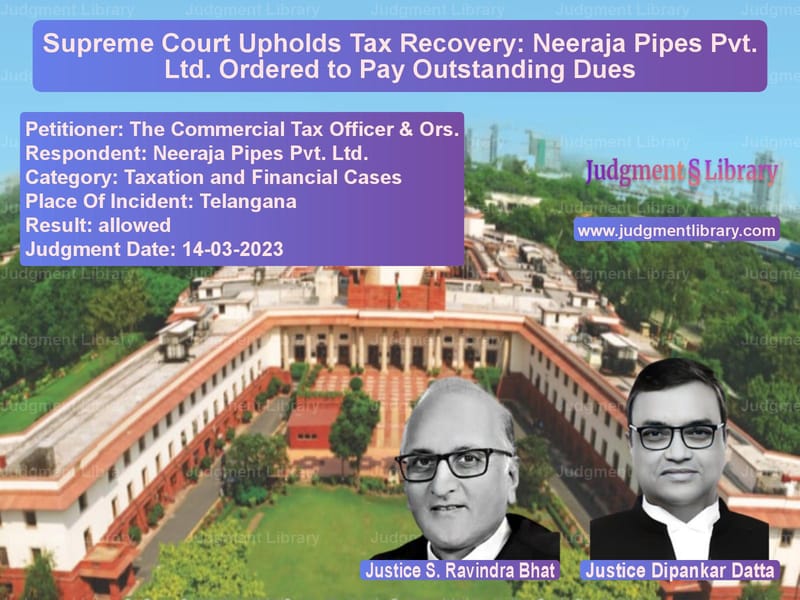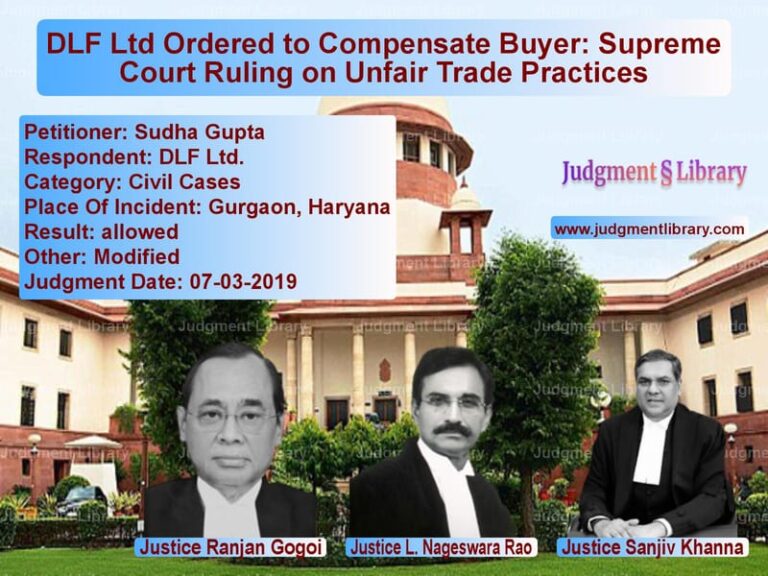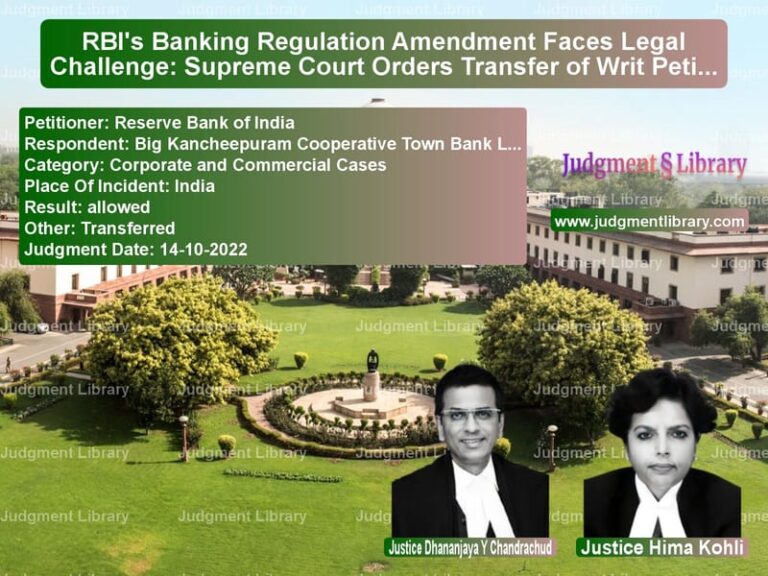Supreme Court Upholds Tax Recovery: Neeraja Pipes Pvt. Ltd. Ordered to Pay Outstanding Dues
The Supreme Court of India recently delivered a judgment in The Commercial Tax Officer & Ors. v. Neeraja Pipes Pvt. Ltd., setting aside a Telangana High Court ruling and upholding tax recovery proceedings initiated by the Commercial Tax Department. The case revolves around the non-payment of Value Added Tax (VAT) and General Sales Tax (GST) dues, leading to the attachment of properties under the Revenue Recovery Act, 1864.
Background of the Case
The dispute began when the Commercial Tax Department assessed tax dues against Neeraja Pipes Pvt. Ltd. for the financial years 2005-06, 2008-09, 2009-10, and 2010-11 under the Andhra Pradesh General Sales Tax Act, 1957 and the Telangana VAT Act, 2005. The department issued demand notices under Section 27 of the VAT Act and attached the company’s properties through orders dated 03.02.2012 and 20.02.2018.
The company contested the assessment and attachment, arguing that it had not received copies of the assessment orders and was unaware of the outstanding dues. It approached the Telangana High Court, which ruled in its favor, setting aside the attachment orders.
Petitioner’s Arguments (Commercial Tax Department)
The Commercial Tax Department, represented by its counsel, argued:
- The company had defaulted on tax payments totaling ₹5,59,58,758.
- The assessment orders were duly served on the company’s directors, Neeraj Agarwal and Pankaj Agarwal, on 31.03.2011.
- Despite multiple notices, the company neither paid the dues nor filed objections to the assessments.
- The company’s bank, Canara Bank, attempted to auction its properties in 2011 to recover loans, prompting the department to assert its tax recovery rights.
- The company failed to dispute the assessment orders in previous legal proceedings, implying acknowledgment of liability.
Respondent’s Arguments (Neeraja Pipes Pvt. Ltd.)
The respondent company countered with the following arguments:
- The assessment orders were never served on the company, making the demand notices invalid.
- The department failed to follow due process under Rule 64 of the Telangana VAT Rules, which mandates proper service of notices.
- The company had requested certified copies of the assessment orders in 2018, but the department did not respond.
- The attachment proceedings were unlawful and should be quashed.
Supreme Court’s Judgment
The Supreme Court bench, comprising Justices S. Ravindra Bhat and Dipankar Datta, ruled in favor of the Commercial Tax Department, reinstating the tax recovery proceedings.
“The assessee was aware of the assessment orders and failed to challenge them in a timely manner. The High Court erred in setting aside the attachment without considering the department’s documentary evidence.”
The Court made the following key observations:
- The assessment orders for 2005-06 to 2008-09 were duly served on the company’s director, making them final and enforceable.
- The company participated in earlier legal proceedings where tax liabilities were acknowledged.
- The delay in raising objections indicated an attempt to evade payment.
- The department followed proper procedures under the VAT Act and the Revenue Recovery Act.
As a result, the Court reinstated the attachment orders and allowed the tax department to proceed with recovery.
Implications of the Judgment
For Businesses:
- Companies must actively monitor tax assessments and respond within statutory deadlines.
- Failure to challenge tax demands in time may lead to property attachment and enforced recovery.
For Tax Authorities:
- The ruling strengthens the department’s ability to recover tax dues through attachment proceedings.
- Authorities must ensure proper documentation of notice service to prevent legal challenges.
For Legal Practitioners:
- The judgment reinforces that procedural lapses do not override tax liability if the assessee was aware of the dues.
- Tax litigation should focus on substantive compliance rather than technical defenses.
Conclusion
The Supreme Court’s decision in The Commercial Tax Officer v. Neeraja Pipes Pvt. Ltd. reaffirms the importance of tax compliance and timely legal action. By reinstating the tax department’s attachment orders, the ruling ensures that businesses cannot evade tax obligations by merely claiming non-receipt of notices. This precedent strengthens tax enforcement mechanisms and clarifies the legal framework for revenue recovery in India.
Petitioner Name: The Commercial Tax Officer & Ors..Respondent Name: Neeraja Pipes Pvt. Ltd..Judgment By: Justice S. Ravindra Bhat, Justice Dipankar Datta.Place Of Incident: Telangana.Judgment Date: 14-03-2023.
Don’t miss out on the full details! Download the complete judgment in PDF format below and gain valuable insights instantly!
Download Judgment: the-commercial-tax-o-vs-neeraja-pipes-pvt.-l-supreme-court-of-india-judgment-dated-14-03-2023.pdf
Directly Download Judgment: Directly download this Judgment
See all petitions in Income Tax Disputes
See all petitions in Tax Refund Disputes
See all petitions in Customs and Excise
See all petitions in Judgment by S Ravindra Bhat
See all petitions in Judgment by Dipankar Datta
See all petitions in allowed
See all petitions in supreme court of India judgments March 2023
See all petitions in 2023 judgments
See all posts in Taxation and Financial Cases Category
See all allowed petitions in Taxation and Financial Cases Category
See all Dismissed petitions in Taxation and Financial Cases Category
See all partially allowed petitions in Taxation and Financial Cases Category







